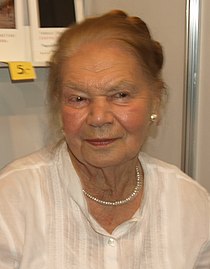Julia Hartwig
Julia Hartwig | |
|---|---|
 Hartwig in 2009 | |
| Born | 14 August 1921 Lublin, Poland |
| Died | 14 July 2017 (aged 95) |
| Occupation | Poet, translator |
Julia Hartwig-Międzyrzecka (14 August 1921 – 14 July 2017) was a Polish writer, poet and translator, considered to be one of Poland's most important poets.[1][2][3]
Life and career[]
She was born and raised in Lublin. She studied Polish and French literature at Warsaw University and continued her studies at the Catholic University of Lublin.[4] Her first poems appeared in the journal Odrodzenie in 1944. Hartwig lived in Paris from 1947-50. In 1954, she published Z niedalekich podróży (From Nearby Places), a collection of articles. She published her first collection of poetry Pożegnania (Farewells) in 1956.[1]
She lived in the United States from 1970 to 1974, later returning to Warsaw.[4] During her time in America, Hartwig took part in the International Writing Program at the University of Iowa and also taught at several universities.[5]
She published translations of French poetry by Guillaume Apollinaire, Blaise Cendrars, Max Jacob, Henri Michaux, and Pierre Reverdy and wrote books on Apollinaire and Gérard de Nerval.[6] She also published translations of American poets such as Robert Bly and Marianne Moore.[1] Hartwig's poetry has been translated into English, French, Italian, Russian, Lithuanian, Serbian, Greek and German.[5]
| External video | |
|---|---|
 | |
Hartwig was awarded the Jurzykowski Prize, the Thornton Wilder Prize from Columbia University's Translation Center and the Georg Trakl Poetry Prize.[6] She received six nominations for the prestigious Nike Award. She is the winner of the 2014 Wisława Szymborska Award for her book of poetry Zapisane.[7]
Personal life[]
In 1954,[8] Hartwig married poet ; he died in 1996.[3][4] She died on 14 July 2017 in Pennsylvania at the age of 95.[9]
She was the sister of the prominent photographer Edward Hartwig.
Selected works[]
- Wolne ręce (Free hands), poetry (1969)
- Wielki pościg (The big race), children's book (1969)
- Dwoistość (Duality), poetry (1971)
- Czuwanie (Vigilance), poetry (1978)
- Chwila postoju (A moment of rest), poetry (1980)
- Obcowanie (Communion), poetry (1987)
- Czułość (Tenderness), poetry (1992)
- Bez pozegnania (No Farewells) (2004), nominated for a Nike Award[10]
Bibliography[]
References[]
- ^ Jump up to: a b c d Segel, Harold B. (2003). The Columbia Guide to the Literatures of Eastern Europe Since 1945. Columbia University Press. p. 207. ISBN 0231114044.
- ^ "Julia Hartwig". culture.pl (in Polish). Adam Mickiewicz Institute.
- ^ Jump up to: a b "Contemporary Authors Online". Biography in Context. Gale. 2010. Retrieved 28 December 2015.
- ^ Jump up to: a b c Miller, Jane Eldridge (2001). Who's who in Contemporary Women's Writing. p. 136. ISBN 0415159806.
- ^ Jump up to: a b Carpenter, Bogdana (May 2008). "Julia Hartwig's in Praise of the Unfinished translated by John and Bogdana Carpenter" (PDF). Slavic Scene. 16 (1): 10. Archived from the original (PDF) on 30 October 2015.
- ^ Jump up to: a b c Grol, Regina (1996). Ambers aglow: an anthology of Polish women's poetry (1981–1995). p. 432. ISBN 0924047151.
- ^ "Hartwig Wins Poetry Prize". Retrieved 24 December 2017.
- ^ "Happy 90th birthday, Julia Hartwig! Poland's late-blooming poet is still in glorious flower". The Book Haven. Stanford University. 3 August 2011.
- ^ "Julia Hartwig nie żyje. Odeszła jedna z najwybitniejszych polskich poetek". gazetapl (in Polish). Retrieved 15 July 2017.
- ^ "Julia Hartwig profile". culture.pl. Adam Mickiewicz Institute.
External links[]
- Cynthia L. Haven, “Invisible You Reign Over the Visible”: Julia Hartwig’s Reality Mysticism,"World Literature Today article from 2011, republished in Milena Jesenská blog.
- 1921 births
- 2017 deaths
- 20th-century Polish poets
- People from Lublin
- Polish translators
- Polish women poets
- International Writing Program alumni
- 20th-century Polish women writers
- 20th-century Polish writers
- Polish expatriates in the United States
- French–Polish translators
- English–Polish translators
- 20th-century translators
- Polish writer stubs